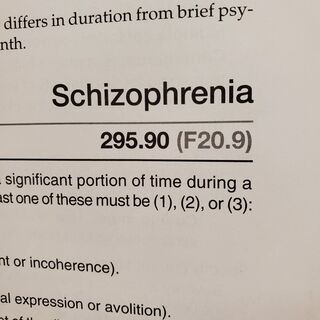Psychiatry
Meaningful Symptoms Are Still Symptoms
Finding meaning in psychiatric symptoms doesn't make them nonpathological.
Posted September 7, 2021 Reviewed by Ekua Hagan
Key points
- A recent focus of British psychology has been on the meaning of psychiatric symptoms, but that does not render them nonpathological.
- The degree of a patient's suffering determines whether the symptoms are pathological, not whether they can be explained.
- Psychiatric symptoms that serve a utilitarian purpose can still come at a much greater cost to the patient overall.
Recent work in British psychology has focused on the meaning of psychiatric symptoms and disorders (see British Psychological Society, 2017). This phenomenological perspective can be contrasted with purely descriptive approaches to mental disorder in which psychiatric phenomena are studied without regard to meaningfulness or interpretability. Much of the recent U.K. writing has been on schizophrenia and the experience of psychosis.

The idea that psychiatric symptoms possess meaning is not new to British psychology; it has been a hallmark of the psychoanalytic approach for more than a century. In the mid-20th century, a cadre of American psychiatrists—Sullivan, Fromm-Reichmann, Arieti, and others—undertook the psychoanalytic investigation of schizophrenia. The second edition of Arieti's Interpretation of Schizophrenia, published in 1974, remains perhaps the most comprehensive psychological understanding of schizophrenia ever published. (See my overview of Arieti's approach to schizophrenia here.) Still today, psychodynamic clinicians apply the theories of psychoanalysis to the understanding of specific pathologies (see McWilliams, 2011; Kernberg, 2021).
What distinguishes much of the recent British work from these psychoanalytic perspectives is the claim that phenomenologically meaningful symptoms are, on that basis, nonpathological. Whereas the psychoanalysts noted above recognize that meaningful symptoms remain symptoms of illness, some modern British theorists contend that the meaningfulness of symptoms renders the concept of mental illness null and void. To these theorists, there is no mental illness, only "experience." I will briefly attempt to counter this perspective below.
The degree of suffering and incapacity is what determines disease
History teaches us that the concept of disease is most closely associated with some combination of suffering and functional impairment in the afflicted individual (Pies, 1978; Pies & Ruffalo, 2020). To my knowledge, whether an entity counts as disease has never relied upon a doctor's (or patient's) ability to derive meaning or "make sense" of its symptoms. Depression can sometimes be made sense of as a reaction to loss, but it is the degree of suffering and incapacity experienced by the individual that renders depression a disease. Incidentally, this is why depression, and psychiatric disorders in general, will remain diseases regardless of whether any identifiable biological cause is ever discovered for them.
Thus, the meaningfulness or interpretability of psychiatric symptoms is a rather poor measure of whether such symptoms constitute a form of disorder or disease. Furthermore, the claim that psychiatric symptoms are instead "experiences" adds nothing to our understanding of them. Everything that occurs in our lives is an experience—and some experiences are diseases!
Psychiatric symptoms can be both a problem and a solution
A related assertion is that psychiatric symptoms may occasionally be helpful, serve a purpose, or even be transformational to the individual, and that for this reason also they do not constitute disease or disorder. Here, again, we must realize that there is nothing unique in the idea that psychiatric symptoms serve a useful purpose for the patient; psychoanalysts from the time of Freud have recognized that psychiatric symptoms are at once a problem and a solution. Even biologically-minded psychiatrists have long recognized the great creativity that can come with illnesses such as bipolar disorder (see, for instance, Fieve, 1989).
What do I mean when I say that psychiatric symptoms can at once be a problem and a solution? Take, for instance, what Arieti (1977) writes about the function of projection in delusions of persecution:
The patient who, before he became psychotic, had a bad opinion of himself, now tends to believe that the others are possible perpetrators of pain and evil. Whereas he earlier accused and denigrated himself, now he believes that the accusation and the denigration come from the external world. No matter how unpleasant it is to feel that people accuse him and persecute him, it is better than to accuse himself. Although persecuted, he feels his spirit is free. He has succeeded in changing an inner anxiety, which was connected with an original unbearable self-image, into an external danger, which is still objectionable, but with which he can live.
Again, what is of relevance here is that for decades psychiatric symptoms have been recognized by psychoanalysts as serving some purpose for the patient, but this should not be taken to imply that symptoms are nonpathological, or that the psychiatric disorders they reflect do not exist as disease states. On the contrary, the psychoanalysts of mid-century American psychiatry knew that they were treating bonafide medical diseases even if the symptoms were seen as useful compromises and their preferred method of treatment was interpretation, not medication.
The costs of psychiatric symptoms may outweigh the benefits
We must also consider the fact that while psychiatric symptoms may provide some temporary utility or even relief, they inevitably come at a much greater cost to the individual than whatever benefit is had. The paranoid patient, for instance, has succeeded at alleviating an inner conflict but has in the process created a world in which any interpersonal contact becomes fraught with intense anxiety, the ability to engage in regular work and play is impaired, and life becomes one endless cycle of suspicion, fear, and mistrust. It is the presence of these aspects that distinguishes schizophrenia as a disease.
While attempts to reemphasize the meaning and interpretability of even the most severe psychiatric symptoms is a worthwhile endeavor, we must recognize that the meaningfulness of psychiatric symptoms does not render them or the diseases they reflect any less pathological. An appreciation of the personal and idiosyncratic meaning of symptoms makes psychiatry all the richer, but only if we don't throw the baby (mental illness) out with the bathwater.
References
Arieti, S. (1977). Cognitive components in human conflict and unconscious motivation. Journal of the American Academy of Psychoanalysis, 5(1), 5-16.
British Psychological Society. (2017). Understanding psychosis and schizophrenia. Author.
Fieve, R. R. (1989). Moodswing: Dr. Fieve on depression (2nd ed.). W. Morrow.
Kernberg, O. F. (2021). Challenges for the future of psychoanalysis. The American Journal of Psychoanalysis, 81, 283-300.
McWilliams, N. (2011). Psychoanalytic diagnosis (2nd ed.). Guilford.
Pies, R. W. (1979). On myths and countermyths: More on Szaszian fallacies. Archives of General Psychiatry, 36(2), 139-144.
Pies, R. W., & Ruffalo, M. L. (2020). What is meant by a psychiatric diagnosis? Psychology Today. https://www.psychologytoday.com/us/blog/freud-fluoxetine/202006/what-is…




